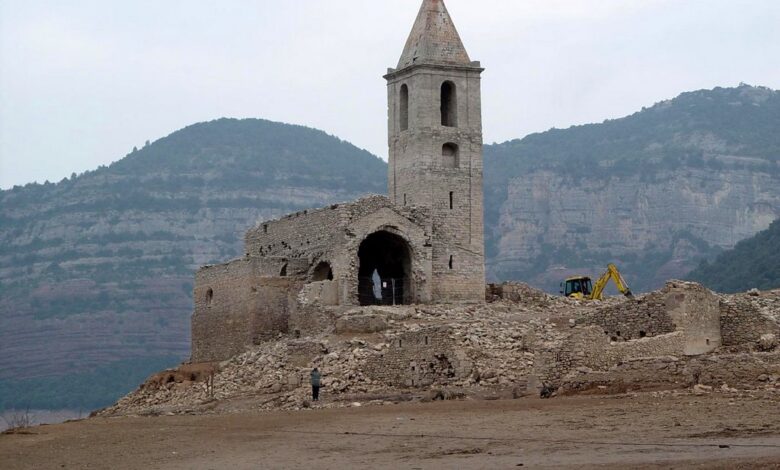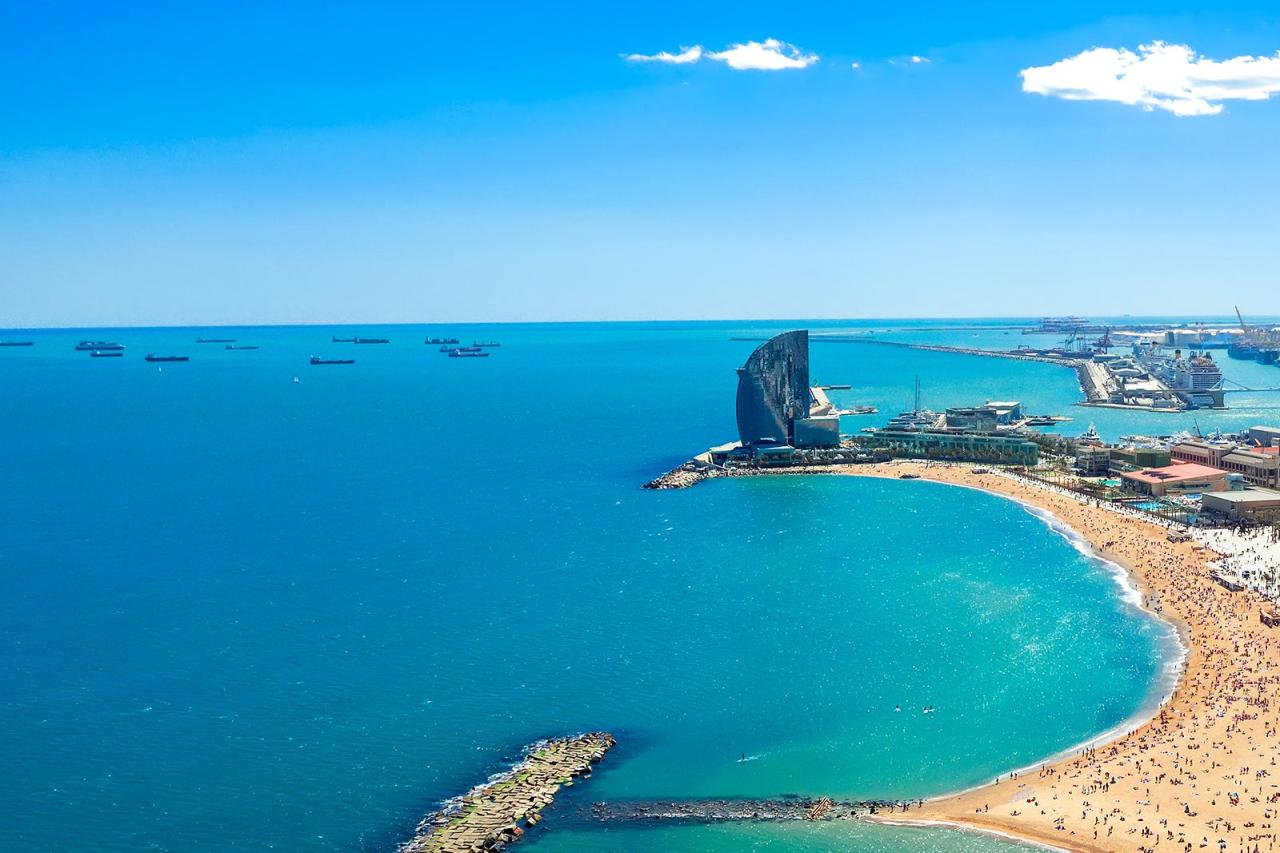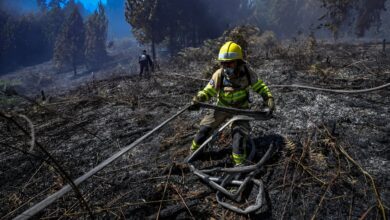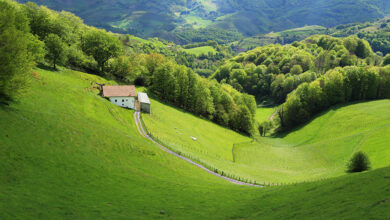
Barcelona Faces Water Restrictions as Drought Emergency Declared
Barcelona faces water restrictions as drought emergency declared, a stark reminder of the escalating climate crisis. The city, renowned for its vibrant culture and stunning architecture, is now grappling with the severe consequences of a prolonged drought, forcing authorities to implement stringent water conservation measures.
This situation highlights the urgent need for sustainable water management practices and underscores the vulnerability of even thriving metropolises to the impacts of climate change.
The current drought is not an isolated event. It is the culmination of years of declining rainfall and rising temperatures, exacerbated by factors such as population growth and unsustainable agricultural practices. The severity of the drought has prompted the Catalan government to declare a state of emergency, triggering a series of water restrictions aimed at preserving the city’s dwindling water supply.
Barcelona’s Drought Emergency
Barcelona, a vibrant city known for its beautiful architecture and lively culture, is facing a severe drought emergency. The situation is dire, with water levels in reservoirs at critically low levels, forcing the authorities to implement stringent water restrictions to conserve this precious resource.
This drought, coupled with the city’s dependence on external water sources, highlights the vulnerability of Barcelona and other Mediterranean cities to climate change and its impacts.
It’s a stark reminder that climate change is affecting us all, from the water restrictions in Barcelona to the proposed SUV parking surcharge in Paris. While Barcelona faces a serious drought, Parisians are being asked to vote on a surcharge for larger vehicles, a move aimed at reducing emissions and promoting more sustainable transportation.
It’s clear that we need to take action on a global scale to address the environmental challenges we face.
Water Restrictions in Barcelona
The water restrictions imposed by the Barcelona authorities are aimed at reducing water consumption and preserving the remaining water reserves. These restrictions affect various aspects of daily life, impacting both residents and businesses. The restrictions include:
- A ban on watering gardens and washing cars.
- Reduced water pressure in public fountains and parks.
- Restrictions on water usage in hotels and restaurants.
- Mandatory water-saving measures in homes and businesses.
History of Droughts in the Region
The Mediterranean region, including Barcelona, has a history of periodic droughts. These droughts are often linked to climate patterns, such as the North Atlantic Oscillation (NAO), which can influence precipitation levels.
Barcelona’s water restrictions, a stark reminder of the severe drought, are a challenge for the city. It’s a reminder that we need to be mindful of our water usage, especially in the face of climate change. But even as we grapple with these real-world issues, it’s important to be aware of the manipulation tactics used by disinformation campaigns, like the anti-Ukraine trolls operation Matryoshka campaign that seeks to sow discord and spread misinformation.
We need to be critical of the information we consume and rely on credible sources to stay informed about the challenges we face, both local and global.
- The region experienced a severe drought in the 1990s, which led to water shortages and agricultural losses.
- Another significant drought occurred in the early 2000s, impacting water supplies and causing widespread concern.
Comparing the Current Drought to Previous Ones
The current drought in Barcelona is considered one of the most severe in recent history. The prolonged period of low rainfall and high temperatures has significantly depleted water reserves, pushing the city to the brink of a water crisis.
- The current drought has surpassed the duration and severity of previous droughts, posing a greater challenge to water management and conservation efforts.
- The impact of the current drought is amplified by the city’s reliance on external water sources, which are also facing pressure due to climate change.
Causes of the Drought
Barcelona’s drought is a complex issue resulting from a combination of factors, with climate change playing a significant role. The city’s water supply relies heavily on the Llobregat River, which has been experiencing historically low water levels. This drought has led to water restrictions and a state of emergency in Barcelona.
Climate Change
Climate change has significantly contributed to the drought in Barcelona. Rising global temperatures have led to increased evaporation rates, reducing the amount of water available in the Llobregat River. This has been exacerbated by a decrease in rainfall in recent years.
Human Activities
Human activities have also played a role in exacerbating the drought. Over-extraction of water for agriculture and industrial use has depleted the water resources in the region. Urbanization has led to increased impervious surfaces, reducing the amount of water that can infiltrate the ground.
Causes and Impacts
| Cause | Impact |
|---|---|
| Climate Change | Increased evaporation rates, decreased rainfall |
| Over-extraction of water | Depletion of water resources in the Llobregat River |
| Urbanization | Reduced water infiltration due to increased impervious surfaces |
Impact on Barcelona
The water restrictions imposed in Barcelona, a city heavily reliant on tourism and industry, have far-reaching consequences across various sectors. These restrictions impact residents, businesses, and the city’s tourism industry, posing significant challenges for Barcelona’s economy and lifestyle.
Impact on Residents
The water restrictions have significantly impacted Barcelona’s residents, forcing them to adapt their daily routines and consumption habits. Residents face limitations on water usage, such as shorter showers, reduced watering of gardens, and restrictions on car washing.
- Water Rationing:Barcelona’s residents are subjected to water rationing, with limits on water usage per household. This can lead to inconvenience and frustration, especially during hot summer months.
- Increased Costs:The water restrictions may lead to higher water bills for residents who exceed their allocated limits, adding financial pressure.
- Lifestyle Changes:Residents have to adapt their daily routines, such as taking shorter showers and reducing water usage for gardening and household chores. This can be disruptive and inconvenient, especially for those accustomed to a certain lifestyle.
Impact on Businesses and Industries, Barcelona faces water restrictions as drought emergency declared
The water restrictions have significant implications for businesses and industries in Barcelona, impacting their operations and profitability.
- Increased Costs:Businesses and industries face higher water bills due to potential penalties for exceeding water usage limits. This can impact their bottom line and make them less competitive.
- Operational Challenges:Some industries, like agriculture, construction, and manufacturing, rely heavily on water. The restrictions can disrupt their operations, leading to production delays or shortages.
- Reduced Productivity:Businesses may experience reduced productivity due to water restrictions, as employees might have to adjust their work schedules or limit their activities.
Impact on Tourism
Barcelona’s tourism industry is a vital economic engine, attracting millions of visitors each year. The water restrictions could have a significant impact on tourism, potentially deterring visitors and affecting the city’s reputation.
- Negative Perception:The water restrictions may create a negative perception of Barcelona, making it appear less desirable for tourists, especially those concerned about environmental issues.
- Reduced Tourist Activities:Tourist attractions and activities, such as swimming pools, water parks, and outdoor markets, may be affected by water restrictions, reducing the appeal of Barcelona for tourists.
- Economic Losses:The decline in tourism due to water restrictions can lead to economic losses for businesses, hotels, restaurants, and other tourism-related sectors.
Impact on Different Sectors
| Sector | Impact | Example |
|---|---|---|
| Residents | Increased water bills, limited water usage, lifestyle changes | Residents having to limit shower time, reduce watering of gardens, and avoid car washing. |
| Businesses and Industries | Increased water bills, operational challenges, reduced productivity | Agriculture facing crop losses due to reduced irrigation, construction projects facing delays due to water restrictions. |
| Tourism | Negative perception, reduced tourist activities, economic losses | Tourists opting for other destinations due to water restrictions, fewer visitors to water parks and swimming pools, reduced revenue for hotels and restaurants. |
Mitigation and Adaptation Strategies: Barcelona Faces Water Restrictions As Drought Emergency Declared

Barcelona’s drought emergency necessitates a multi-faceted approach to manage water resources and ensure long-term water security. The city is implementing a range of measures to conserve water, adapt to changing climate conditions, and invest in sustainable solutions.
Water Conservation Initiatives
Water conservation is a crucial component of Barcelona’s drought mitigation strategy. The city is implementing a variety of initiatives to reduce water consumption across different sectors.
It’s a strange world we live in, isn’t it? Barcelona faces water restrictions due to a severe drought, while on the other side of the world, the Thai government says it will ban recreational cannabis use. It makes you wonder if we’re all just spinning our wheels, trying to solve one problem while another pops up somewhere else.
Hopefully, Barcelona can find a way to conserve water before things get worse, and perhaps Thailand will reconsider its decision on cannabis, as it could have potential benefits for the country’s economy and healthcare.
- Public Awareness Campaigns:Barcelona has launched public awareness campaigns to educate citizens about water conservation practices, such as reducing shower time, fixing leaks, and using water-efficient appliances. These campaigns emphasize the importance of individual actions in collective water saving efforts.
- Water Restrictions:The city has imposed water restrictions on non-essential uses, such as watering gardens and filling swimming pools. These restrictions aim to prioritize water for essential needs, such as drinking and sanitation.
- Smart Water Metering:Barcelona is investing in smart water meters that provide real-time data on water consumption. This data helps identify leaks, monitor water usage patterns, and optimize water distribution.
- Water-Efficient Infrastructure:The city is upgrading its water infrastructure to reduce water loss through leaks and improve efficiency. This includes replacing aging pipes and implementing leak detection systems.
Long-Term Solutions for Water Security
Beyond immediate mitigation measures, Barcelona is investing in long-term solutions to address water security challenges.
- Desalination Plants:Barcelona is expanding its desalination capacity to provide a reliable source of fresh water. Desalination plants convert seawater into potable water, offering a sustainable alternative to relying solely on rainfall.
- Water Reuse:The city is exploring opportunities to reuse treated wastewater for non-potable purposes, such as irrigation and industrial use. This reduces reliance on freshwater sources and promotes a circular water economy.
- Rainwater Harvesting:Barcelona is encouraging rainwater harvesting systems in homes and buildings. This allows for the collection and storage of rainwater for non-potable uses, reducing dependence on municipal water supplies.
- Water Management Plans:Barcelona is developing comprehensive water management plans that integrate demand management, supply augmentation, and climate change adaptation strategies. These plans aim to ensure long-term water security and resilience.
Global Implications

The drought affecting Barcelona is not an isolated event. It is a symptom of a larger trend of water scarcity and climate change impacting the entire Mediterranean region. Understanding the broader implications of this drought is crucial for developing effective solutions and mitigating future risks.
The Mediterranean’s Vulnerability
The Mediterranean region is particularly susceptible to drought due to its hot, dry climate and high population density. Water resources are already under pressure from increasing demand for agriculture, tourism, and urban development. Climate change is exacerbating the situation by increasing temperatures and altering precipitation patterns, leading to more frequent and intense droughts.
The current drought in Barcelona is a stark reminder of the region’s vulnerability and the need for proactive water management strategies.
Comparison with Other Drought-Affected Areas
While Barcelona faces severe water restrictions, it is not alone. Other areas in the Mediterranean region are experiencing similar challenges. For instance, in 2022, Italy declared a state of emergency in five regions due to drought, leading to water rationing and restrictions on agricultural irrigation.
The situation in Greece is equally dire, with the country facing its worst drought in decades, resulting in wildfires and water shortages. These examples highlight the widespread nature of the drought crisis and the need for regional cooperation in addressing this challenge.
Potential Global Consequences of Water Scarcity
The consequences of water scarcity extend far beyond the Mediterranean region. Water is a fundamental resource for human life, agriculture, and industry. Its scarcity can lead to a range of challenges, including:
- Food security: Water is essential for agriculture, and its scarcity can lead to crop failures, reduced food production, and rising food prices. This can have significant implications for global food security, particularly in regions already facing food insecurity.
- Economic growth: Water scarcity can hinder economic growth by impacting industries that rely on water, such as agriculture, manufacturing, and tourism. This can lead to job losses, reduced investment, and overall economic decline.
- Social unrest: Water scarcity can lead to social unrest and conflict, particularly in areas where access to water is limited or unevenly distributed. Competition for scarce resources can escalate tensions and lead to instability.
- Migration: Water scarcity can force people to migrate from drought-stricken areas in search of water and other resources. This can lead to increased pressure on existing resources and social systems in receiving areas.
Impact on Different Regions
| Region | Impact | Example |
|---|---|---|
| Mediterranean | Increased risk of wildfires, crop failures, water rationing, and social unrest | The 2022 drought in Italy led to wildfires in the south, crop losses in the north, and water rationing in several cities. |
| Sub-Saharan Africa | Increased food insecurity, malnutrition, and conflict over water resources | The ongoing drought in the Horn of Africa has led to widespread famine, displacement, and conflict. |
| South Asia | Reduced agricultural productivity, water shortages in urban areas, and increased vulnerability to climate change | India is facing a severe water crisis, with many cities experiencing water shortages and the agricultural sector struggling with drought. |
| Australia | Frequent droughts, reduced water availability for agriculture and urban use, and increased risk of wildfires | The Millennium Drought (1997-2009) in Australia had a significant impact on the country’s economy, environment, and society. |
Final Review
The drought in Barcelona serves as a stark warning to cities around the world. As climate change intensifies, water scarcity is likely to become a more pressing issue, demanding innovative solutions and collaborative efforts. The resilience of Barcelona’s citizens and the proactive measures taken by the government offer a glimmer of hope.
By embracing sustainable practices and investing in long-term water security, cities can mitigate the risks of drought and ensure a future where water remains a precious resource for all.






